英语语法一般过去时归纳总结
- 格式:doc
- 大小:66.00 KB
- 文档页数:9

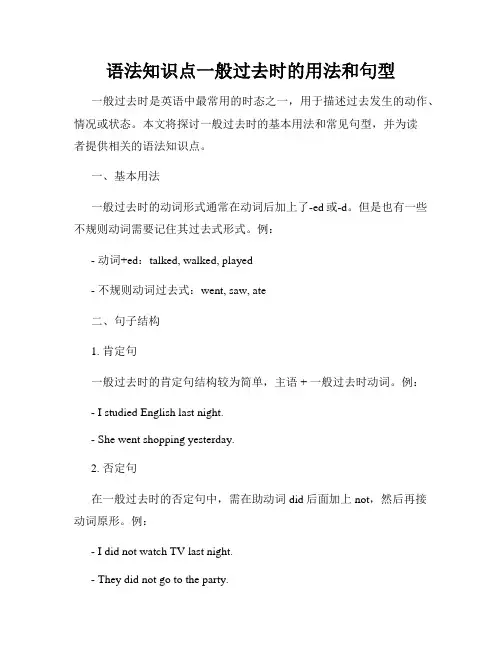
语法知识点一般过去时的用法和句型一般过去时是英语中最常用的时态之一,用于描述过去发生的动作、情况或状态。
本文将探讨一般过去时的基本用法和常见句型,并为读者提供相关的语法知识点。
一、基本用法一般过去时的动词形式通常在动词后加上了-ed或-d。
但是也有一些不规则动词需要记住其过去式形式。
例:- 动词+ed:talked, walked, played- 不规则动词过去式:went, saw, ate二、句子结构1. 肯定句一般过去时的肯定句结构较为简单,主语 + 一般过去时动词。
例:- I studied English last night.- She went shopping yesterday.2. 否定句在一般过去时的否定句中,需在助动词did后面加上not,然后再接动词原形。
例:- I did not watch TV last night.- They did not go to the party.3. 一般疑问句一般过去时的一般疑问句需要将助动词did放在句首,然后将主语放在did后面,接原形动词。
例:- Did you finish your homework yesterday?- Did they visit their grandparents last weekend?三、时间状语一般过去时常与表示过去时间的状语连用,以明确动作或状态发生的时间。
以下是一些常用的时间状语:- yesterday- last week/month/year- in 1990- a few days ago- when I was a child- at that time- in the past四、陈述句和疑问句的回答在陈述句中,我们通常用完整的句子回答,而在疑问句中,我们可以用简略回答或完整回答。
例:- Did you go to the party? - Yes, I did. / No, I didn't.- Did he finish his homework? - Yes, he did. / No, he didn't.五、经常与一般过去时连用的词汇1. 过去连续性的动作:- was/were + 动词-ing:I was playing basketball when she called me. - used to + 动词原形:I used to walk to school when I was young.2. 时间副词:- ago:He moved to New York two years ago.- before:I had never seen such a beautiful scenery before.- when:I was reading a book when the phone rang.3. 愿望:- wish + 一般过去时:I wish I knew the answer.六、一般过去时的注意事项1. 与现在的区别:一般过去时描述过去的动作、情况或状态,与现在时相对应。
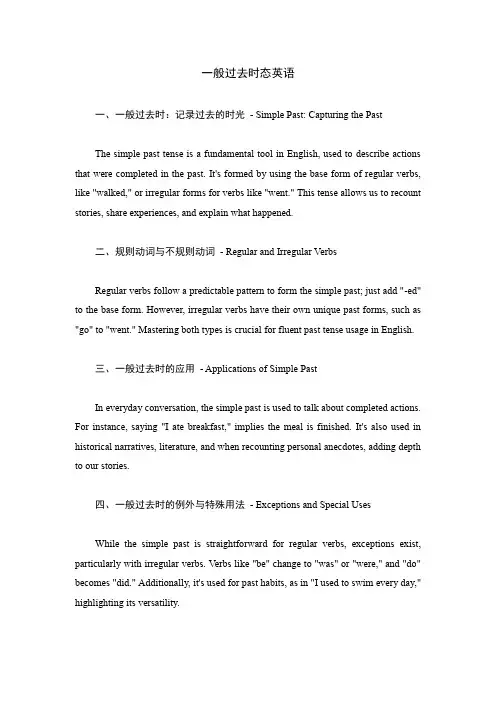
一般过去时态英语一、一般过去时:记录过去的时光- Simple Past: Capturing the PastThe simple past tense is a fundamental tool in English, used to describe actions that were completed in the past. It's formed by using the base form of regular verbs, like "walked," or irregular forms for verbs like "went." This tense allows us to recount stories, share experiences, and explain what happened.二、规则动词与不规则动词- Regular and Irregular VerbsRegular verbs follow a predictable pattern to form the simple past; just add "-ed" to the base form. However, irregular verbs have their own unique past forms, such as "go" to "went." Mastering both types is crucial for fluent past tense usage in English.三、一般过去时的应用- Applications of Simple PastIn everyday conversation, the simple past is used to talk about completed actions. For instance, saying "I ate breakfast," implies the meal is finished. It's also used in historical narratives, literature, and when recounting personal anecdotes, adding depth to our stories.四、一般过去时的例外与特殊用法- Exceptions and Special UsesWhile the simple past is straightforward for regular verbs, exceptions exist, particularly with irregular verbs. Verbs like "be" change to "was" or "were," and "do" becomes "did." Additionally, it's used for past habits, as in "I used to swim every day," highlighting its versatility.五、总结- Conclusion“一般过去时态英语”是英语学习中的重要语法点,它帮助我们讲述过去的故事,分享经历,解释已经发生的事情。
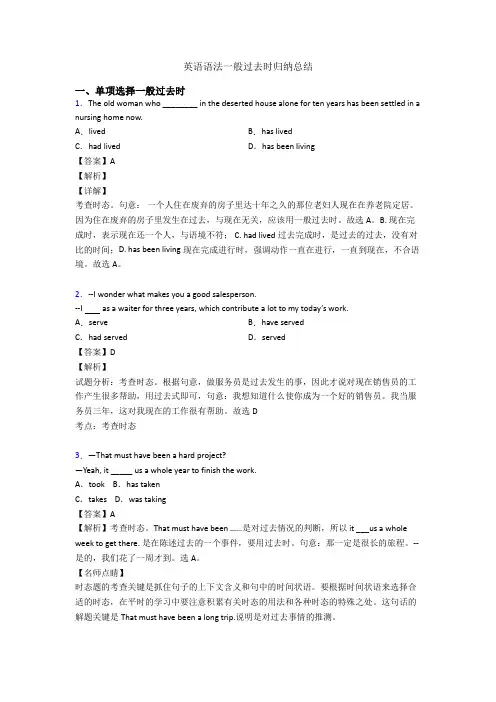
英语语法一般过去时归纳总结一、单项选择一般过去时1.The old woman who ________ in the deserted house alone for ten years has been settled in a nursing home now.A.lived B.has livedC.had lived D.has been living【答案】A【解析】【详解】考查时态。
句意:一个人住在废弃的房子里达十年之久的那位老妇人现在在养老院定居。
因为住在废弃的房子里发生在过去,与现在无关,应该用一般过去时。
故选A。
B. 现在完成时,表示现在还一个人,与语境不符; C. had lived过去完成时,是过去的过去,没有对比的时间;D. has been living现在完成进行时,强调动作一直在进行,一直到现在,不合语境。
故选A。
2.--I wonder what makes you a good salesperson.--I as a waiter for three years, which contribute a lot to my tod ay’s work.A.serve B.have servedC.had served D.served【答案】D【解析】试题分析:考查时态。
根据句意,做服务员是过去发生的事,因此才说对现在销售员的工作产生很多帮助,用过去式即可,句意:我想知道什么使你成为一个好的销售员。
我当服务员三年,这对我现在的工作很有帮助。
故选D考点:考查时态3.—That must have been a hard project?—Yeah, it _____ us a whole year to finish the work.A.took B.has takenC.takes D.was taking【答案】A【解析】考查时态。
That must have been ……是对过去情况的判断,所以 it ___us a whole week to get there. 是在陈述过去的一个事件,要用过去时。
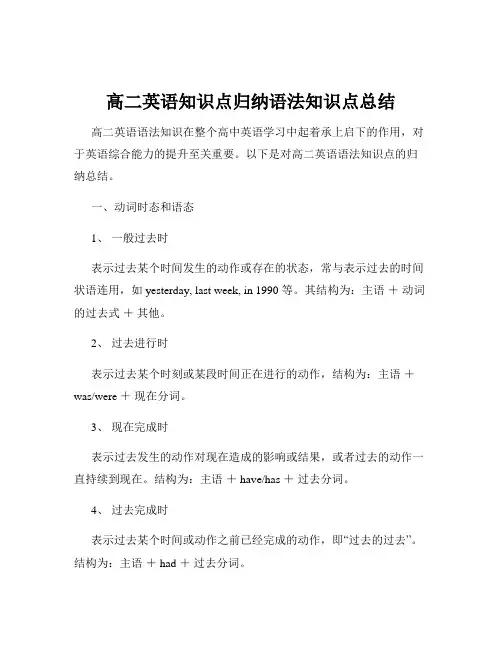
高二英语知识点归纳语法知识点总结高二英语语法知识在整个高中英语学习中起着承上启下的作用,对于英语综合能力的提升至关重要。
以下是对高二英语语法知识点的归纳总结。
一、动词时态和语态1、一般过去时表示过去某个时间发生的动作或存在的状态,常与表示过去的时间状语连用,如 yesterday, last week, in 1990 等。
其结构为:主语+动词的过去式+其他。
2、过去进行时表示过去某个时刻或某段时间正在进行的动作,结构为:主语+was/were +现在分词。
3、现在完成时表示过去发生的动作对现在造成的影响或结果,或者过去的动作一直持续到现在。
结构为:主语+ have/has +过去分词。
4、过去完成时表示过去某个时间或动作之前已经完成的动作,即“过去的过去”。
结构为:主语+ had +过去分词。
5、一般将来时表示将来要发生的动作或存在的状态,结构有:will +动词原形、be going to +动词原形等。
6、将来进行时表示将来某个时刻正在进行的动作,结构为:will be +现在分词。
7、被动语态强调动作的承受者,结构为:be +过去分词。
各种时态都有相应的被动语态形式。
二、非谓语动词1、动词不定式具有名词、形容词和副词的特征,在句中可作主语、宾语、定语、状语等。
2、动名词具有名词的特征,可作主语、宾语、定语等。
3、分词包括现在分词和过去分词。
现在分词表示主动和进行,过去分词表示被动和完成。
分词在句中可作定语、状语、宾语补足语等。
三、定语从句1、关系代词引导的定语从句关系代词有 that, which, who, whom, whose 等,在从句中充当主语、宾语、定语等成分。
2、关系副词引导的定语从句关系副词有 when, where, why 等,在从句中充当状语。
四、名词性从句1、主语从句在复合句中充当主语的从句,常见的引导词有 that, whether, what 等。
2、宾语从句在复合句中充当宾语的从句,引导词有 that, if/whether, what 等。
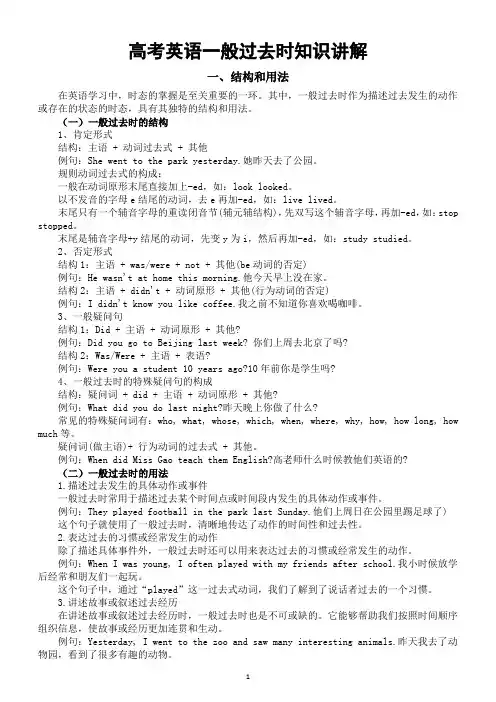
高考英语一般过去时知识讲解一、结构和用法在英语学习中,时态的掌握是至关重要的一环。
其中,一般过去时作为描述过去发生的动作或存在的状态的时态,具有其独特的结构和用法。
(一)一般过去时的结构1、肯定形式结构:主语 + 动词过去式 + 其他例句:She went to the park yesterday.她昨天去了公园。
规则动词过去式的构成:一般在动词原形末尾直接加上-ed,如:look looked。
以不发音的字母e结尾的动词,去e再加-ed,如:live lived。
末尾只有一个辅音字母的重读闭音节(辅元辅结构),先双写这个辅音字母,再加-ed,如:stop stopped。
末尾是辅音字母+y结尾的动词,先变y为i,然后再加-ed,如:study studied。
2、否定形式结构1:主语 + was/were + not + 其他(be动词的否定)例句:He wasn't at home this morning.他今天早上没在家。
结构2:主语 + didn't + 动词原形 + 其他(行为动词的否定)例句:I didn't know you like coffee.我之前不知道你喜欢喝咖啡。
3、一般疑问句结构1:Did + 主语 + 动词原形 + 其他?例句:Did you go to Beijing last week? 你们上周去北京了吗?结构2:Was/Were + 主语 + 表语?例句:Were you a student 10 years ago?10年前你是学生吗?4、一般过去时的特殊疑问句的构成结构:疑问词 + did + 主语 + 动词原形 + 其他?例句:What did you do last night?昨天晚上你做了什么?常见的特殊疑问词有:who, what, whose, which, when, where, why, how, how long, how much等。
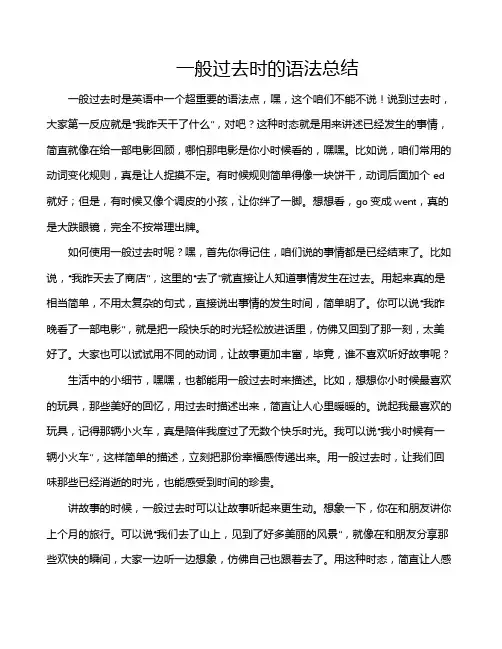
一般过去时的语法总结一般过去时是英语中一个超重要的语法点,嘿,这个咱们不能不说!说到过去时,大家第一反应就是“我昨天干了什么”,对吧?这种时态就是用来讲述已经发生的事情,简直就像在给一部电影回顾,哪怕那电影是你小时候看的,嘿嘿。
比如说,咱们常用的动词变化规则,真是让人捉摸不定。
有时候规则简单得像一块饼干,动词后面加个ed 就好;但是,有时候又像个调皮的小孩,让你绊了一脚。
想想看,go变成went,真的是大跌眼镜,完全不按常理出牌。
如何使用一般过去时呢?嘿,首先你得记住,咱们说的事情都是已经结束了。
比如说,“我昨天去了商店”,这里的“去了”就直接让人知道事情发生在过去。
用起来真的是相当简单,不用太复杂的句式,直接说出事情的发生时间,简单明了。
你可以说“我昨晚看了一部电影”,就是把一段快乐的时光轻松放进话里,仿佛又回到了那一刻,太美好了。
大家也可以试试用不同的动词,让故事更加丰富,毕竟,谁不喜欢听好故事呢?生活中的小细节,嘿嘿,也都能用一般过去时来描述。
比如,想想你小时候最喜欢的玩具,那些美好的回忆,用过去时描述出来,简直让人心里暖暖的。
说起我最喜欢的玩具,记得那辆小火车,真是陪伴我度过了无数个快乐时光。
我可以说“我小时候有一辆小火车”,这样简单的描述,立刻把那份幸福感传递出来。
用一般过去时,让我们回味那些已经消逝的时光,也能感受到时间的珍贵。
讲故事的时候,一般过去时可以让故事听起来更生动。
想象一下,你在和朋友讲你上个月的旅行。
可以说“我们去了山上,见到了好多美丽的风景”,就像在和朋友分享那些欢快的瞬间,大家一边听一边想象,仿佛自己也跟着去了。
用这种时态,简直让人感受到旅行的每一份惊喜,恨不得马上再去一次。
还记得那次我在海边捡贝壳,真的是乐在其中,现在想起来,心里还在笑呢。
有些人可能会觉得过去时有点无聊,但其实只要掌握了诀窍,就能玩得很开心。
比如,试试把动词变化写成歌词,甚至把故事编成一个小短剧,嘿嘿,真是太有趣了。
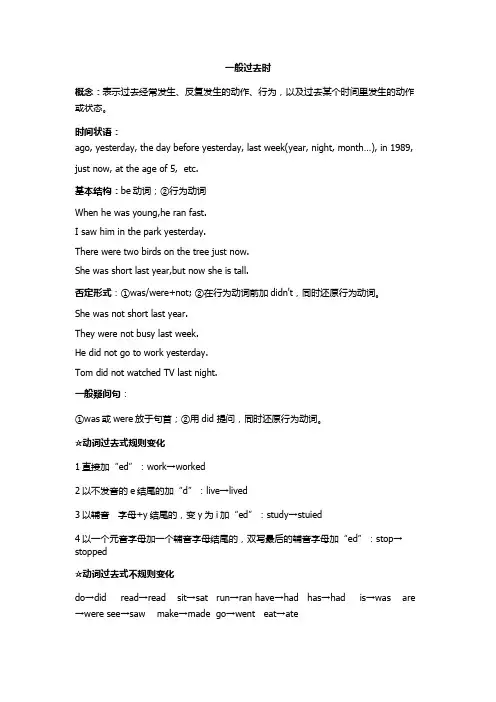
一般过去时概念:表示过去经常发生、反复发生的动作、行为,以及过去某个时间里发生的动作或状态。
时间状语:ago, yesterday, the day before yesterday, last week(year, night, month…), in 1989, just now, at the age of 5, etc.基本结构:be动词;②行为动词When he was young,he ran fast.I saw him in the park yesterday.There were two birds on the tree just now.She was short last year,but now she is tall.否定形式:①was/were+not; ②在行为动词前加didn't,同时还原行为动词。
She was not short last year.They were not busy last week.He did not go to work yesterday.Tom did not watched TV last night.一般疑问句:①was或were放于句首;②用did 提问,同时还原行为动词。
☆动词过去式规则变化1直接加“ed”:work→worked2以不发音的e结尾的加“d”:live→lived3以辅音字母+y结尾的,变y为i加“ed”:study→stuied4以一个元音字母加一个辅音字母结尾的,双写最后的辅音字母加“ed”:stop→stopped☆动词过去式不规则变化do→did read→read sit→sat run→ran have→had has→had is→was are →were see→saw make→made go→went eat→ate一般过去时的练习一、用所给的动词的适当形式填空。
⒈He ___________(visit) the Great Wall last year.2.We____________(have) a good time yesterday.3.We often __________(go) to school by bus last year.4.I __________(live)in the village when I was a child.5.Mike__________(see) a big tiger in the nature park last year.6.Sam___________ (do) the housework yesterday.7.________(do) you _________(enjoy) yourself yesterday?8.________(do)you __________(play) the violin in the artroom yesterday?9.I __________ (eat) a big pizza yesterday.10.There_________ (be) many sheep on the farm last year.11. I _________ (watch) a cartoon on Saturday.12. Her father __________ (read) a newspaper last night.13. We _________ to zoo yesterday, we ___________ to the park. (go)14. _________ you __________ (visit) your relatives last Spring Festival?15. _________ he __________ (fly) a kite on Sunday? Yes, he __________.二、单项选择( ) 1. She watered the flowers ________.A tomorrowB sometimesC yesterday morning( ) 2.What ____ Mike do last weekend ?A doB doesC did( ) 3. I ___ my room last Sunday.A cleanedB cleanC am cleaning( ) 4. _____ you _____ TV last night .A Do, watchB Did, watchC Did, watched( ) 5.---Did your father write an e-mail yesterday ?A Yes, he did.B Yes, he doesC No, he don’t( ) 6.They _____ on a trip in February ,2007.A are goingB goingC went( ) 7. ____ he ____ football two days ago?A Does , playB Did , playedC Did , play三、Be动词的过去时练习(一)用be动词的适当形式填空。

初中英语语法——一般过去时知识点总结归纳一般过去时——表示过去发生的动作或事件。
概念: 1) 表示过去某个时间发生的动作或存在的状态。
常和表示过去的时间状语连用. 如: yesterday , last week , in 1998 , two days ago 等。
如: I went to a movie yesterday. 我昨天去看了一场电影。
2) 也可表示过去经常或反复发生的动作。
如: He always went to work by bike last week。
构成: (1) 主语+ be (was / were ) +……(2) 主语+ 实义动词过去式+【解析】常和表示过去的时间状语连用,如yesterday, last night, the day before yesterday, 3 days ago...含有be动词的句子,将be动词变为过去式。
am, is的过去式为was, are的过去式为were:I was at the butcher's.You were a student a year ago.The teacher was very beautiful ten years ago.★变否定句在be动词后面加notI was not at the butcher's.You were not a student a year ago.The teacher was not very beautiful ten years ago.★变疑问句将be动词移动到句首Were you at the butcher's?Were you a student a year ago?Was the teacher very beautiful ten years ago?★肯定回答否定回答Yes, I was. / No, I was not.Yes, you were. / No, you were not.Yes, he/she was. / No, he/she was not.★特殊疑问句What did you do?(必背)不含有be动词的句子,将动词变为过去式:I finished my homework yesterday.The boy went to a restaurant.The Sawyers lived at King Street a year ago.★变疑问句在句首加did,动词变为原型Did you finish your homework yesterday?Did the boy go to a restaurant?Did the Sawyers live at King Street a year ago?★变否定句在主语和动词之间加did notI did not finish my homework yesterday.The boy did not go to a restaurant.The Sawyers did not live at King Street a year ago.★肯定回答及否定回答Yes, I did. / No, I didn't.Yes, he did. / No, he didn't.Yes, they did. / No, they did not.。
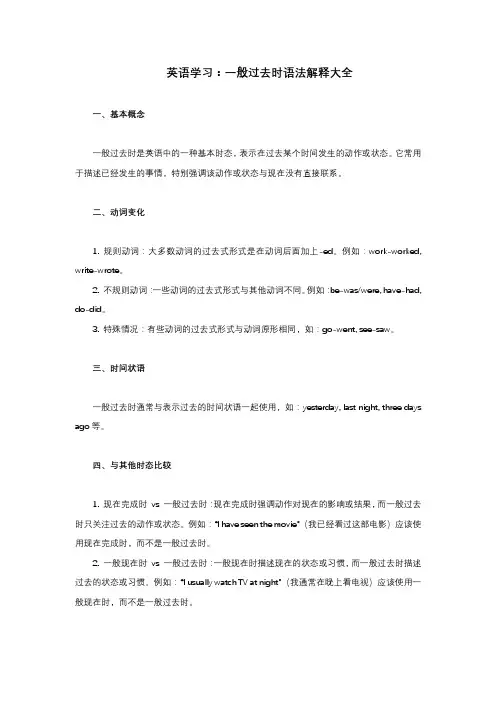
英语学习:一般过去时语法解释大全一、基本概念一般过去时是英语中的一种基本时态,表示在过去某个时间发生的动作或状态。
它常用于描述已经发生的事情,特别强调该动作或状态与现在没有直接联系。
二、动词变化1. 规则动词:大多数动词的过去式形式是在动词后面加上-ed。
例如:work-worked, write-wrote。
2. 不规则动词:一些动词的过去式形式与其他动词不同。
例如:be-was/were, have-had, do-did。
3. 特殊情况:有些动词的过去式形式与动词原形相同,如:go-went, see-saw。
三、时间状语一般过去时通常与表示过去的时间状语一起使用,如:yesterday, last night, three days ago等。
四、与其他时态比较1. 现在完成时vs 一般过去时:现在完成时强调动作对现在的影响或结果,而一般过去时只关注过去的动作或状态。
例如:“I have seen the movie”(我已经看过这部电影)应该使用现在完成时,而不是一般过去时。
2. 一般现在时vs 一般过去时:一般现在时描述现在的状态或习惯,而一般过去时描述过去的状态或习惯。
例如:“I usually watch TV at night”(我通常在晚上看电视)应该使用一般现在时,而不是一般过去时。
五、特殊用法1. 表达过去的经验:例如:“I visited Paris last year”(我去年参观了巴黎)。
2. 表达假设条件:例如:“If I were you, I would do it”(如果我是你,我会去做这件事)。
六、与过去进行时的区别1. 时间焦点:过去进行时强调在过去某一段时间正在发生的动作,而一般过去时描述过去的某个时间点发生的动作。
2. 语态选择:过去进行时用于描述过去某个时刻正在进行的动作,通常使用进行体(was/were+动词ing形式),而一般过去时则直接使用动词的过去式形式。
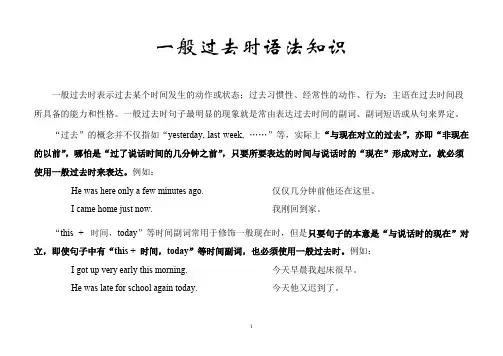
【精品】英语语法一般过去时归纳总结一、单项选择一般过去时1.—What do you think of the Great Wall of China?—Splendid! When I was in Beijing, I ________ it twice.A.had visited B.visitedC.have visited D.would visit【答案】B【解析】【详解】考查时态。
句意:——你认为中国的长城怎么样?——好极了!在北京的时候我参观过两次。
根据“When I was in Beijing”可知,此处用一般过去时,故B项正确。
2.--I wonder what makes you a good salesperson.--I as a waiter for three years, which contribute a lot to my today’s work.A.serve B.have servedC.had served D.served【答案】D【解析】试题分析:考查时态。
根据句意,做服务员是过去发生的事,因此才说对现在销售员的工作产生很多帮助,用过去式即可,句意:我想知道什么使你成为一个好的销售员。
我当服务员三年,这对我现在的工作很有帮助。
故选D考点:考查时态3.—That must have been a hard project?—Yeah, it _____ us a whole year to finish the work.A.took B.has takenC.takes D.was taking【答案】A【解析】考查时态。
That must have been ……是对过去情况的判断,所以 it ___us a whole week to get there. 是在陈述过去的一个事件,要用过去时。
句意:那一定是很长的旅程。
--是的,我们花了一周才到。
英语一般过去时语法知识点总结(笔记完整版)这一篇就够了1 一般过去时的定义总结1.1 描述发生在过去时间的事情或者动作。
The meeting started at 9 o’clock. 会议在9点就开始了。
1.2 表示在过去时间所存在的状态。
I was sick last month. 我上个月生病了。
1.3 表示发生在过去,但是已经结束的事件或者动作。
We had hamburger for lunch. 我们午饭吃了汉堡。
看下面表格区分一般过去时一般现在时和一般将来时一般过去时I was two years old then. 我那时候2岁。
一般现在时I am two years old now. 我现在2岁。
一般将来时I will be two years old next Monday. 到下周一我就2岁了。
2. 一般过去时的表现/结构形式。
在汉语中表示过去只需要说时间就可以了,过去的时间就表示过去。
比如,我昨天吃汉堡了。
就表示过去但是在英语中,表示过去除了加时间(有时候也不加),还需要在动词上体现出来。
具体有2种表现形式。
一种是在Be动词上体现,一种是在实义动词(能够独立做谓语的动词)上体现。
2.1 Be动词的一般过去时Be动词的一般过去时视主语不同,有2种was/were。
主语为单数或者我时,用was。
I was two years old last year. 我去年2岁She was two years old last year. 她去年2岁主语为复数或你时用were。
We were in the library this morning。
早上我们在图书馆You were thin last year。
你去年比较苗条。
Be动词过去时的肯定及否定肯定句结构:主语+was/were +否定句结构:主语+was/were +not+否定与的缩写结构was not = wasn’t , were not = weren’t例句:翠花去年是个胖子Cuihua was fat last year.翠花去年不胖Cuihua was not(wasn’t) fat last year.Be 动词过去时的一般疑问句,与常规一般疑问句一样,把Be动词提前即可。
高中英语时态语法总结归纳英语时态是表示动作发生时间的一种语法形式,在高中英语学习中扮演着重要的角色。
正确使用时态可以使语言表达更加准确和流畅。
本文将对高中英语常用的时态进行总结归纳,以帮助学生更好地掌握时态的用法。
一、一般现在时 (Simple Present Tense)一般现在时用于表示经常性的动作、客观事实、真理、习惯和固定时间表等。
1. 结构:主语 + 动词原形(单数加s或es)+ 其他2. 示例:- He plays soccer every weekend.(他每个周末都踢足球。
)- Water boils at 100 degrees Celsius.(水在100摄氏度时沸腾。
)- I usually go to bed at 10 o'clock.(我通常十点钟上床睡觉。
)二、一般过去时 (Simple Past Tense)一般过去时用于表示过去某个时间发生的动作或状态。
1. 结构:主语 + 动词过去式(一般过去时动词过去式的变化规则多样)2. 示例:- They went to the park yesterday.(他们昨天去了公园。
)- She watched a movie last night.(她昨晚看电影了。
)- I played the guitar when I was young.(我年轻时弹吉他。
)三、一般将来时 (Simple Future Tense)一般将来时用于表示将来某个时间或情况下发生的动作或状态。
1. 结构:主语 + will/shall + 动词原形2. 示例:- We will study English tomorrow.(我们明天将学习英语。
)- He shall help you with your assignment.(他将帮助你完成作业。
)- They won't go to the party this weekend.(他们这个周末不会去参加派对。
英语一般过去时语法知识讲解一般过去时表示过去某个时间里发生的动作或状态;过去习惯性、经常性的动作、行为;过去主语所具备的能力和性格。
下面小编给大家分享了有关一般过去时的英语语法知识,一起来看看吧!一般过去时的结构一、构成方法一般过去时用动词的过去式构成,即在动词原形后加ed。
二、用法说明1、表示在过去某个时间所发生的动作或所处的状态。
常与yesterday, last week, in 1989, just now, a moment ago, the other day等连用。
如:He was here just now. 他刚才还在这里。
What did you do yesterday? 你昨天做了什么事?2、在过去一段时间内的经常性或习惯性动作。
如:We often played together when we were children. 我们小时候常在一起玩。
注:表示过去经常发生的动作还可用used to 和would。
如:He used to smoke a lot, but he doesn't now. 他过去经常抽烟,但现在不抽了。
Whenever we were in trouble, he would help us. 每当我们遇到困难,他都会帮助我们。
3、表示主语过去的特征或性格。
如:At that time she was very good at English. 那时她英语学得很好。
4、用在状语从句中表示过去将来。
如:He said he would wait until they came back.5、一般过去时有时可以表示现在,多与want, hope, wonder, think, intend 等动词连用,使语气更委婉。
如:I wondered if you could help me. 不知你能不能帮我一下。
6、有时用一般过去时也是时态一致的需要。
高中英语语法八个时态归纳总结英语语法中的时态是指动词形态变化来表示不同的时间状态。
在英语语法中,共有八个时态,包括一般现在时、一般过去时、一般将来时、现在进行时、过去进行时、过去将来进行时、现在完成时和过去完成时。
这里将对这八个时态进行归纳总结,以帮助高中学生更好地理解和运用这些时态。
1. 一般现在时(Simple Present)一般现在时表示经常性、习惯性的动作或真理,也用于表示主语在现在的状态或职业。
例句:- I eat breakfast every morning.(我每天早上吃早餐。
)- The sun rises in the east.(太阳从东方升起。
)- She works as a teacher.(她是一名教师。
)2. 一般过去时(Simple Past)一般过去时表示过去某个时间发生或存在的动作或状态。
例句:- I studied English yesterday.(昨天我学习了英语。
)- They went to the beach last summer.(他们去年夏天去了海滩。
)- She lived in London for five years.(她在伦敦住了五年。
)3. 一般将来时(Simple Future)一般将来时表示将来某个时间要发生的动作或存在的状态。
例句:- I will go shopping tomorrow.(我明天要去购物。
)- They are going to visit their grandparents next month.(他们下个月要去看望他们的祖父母。
)- She is going to study abroad after graduation.(她毕业后打算出国留学。
)4. 现在进行时(Present Continuous)现在进行时表示现在正在进行的动作或状态。
例句:- I am reading a book right now.(我现在正在读一本书。
一般过去时和过去进行时的语法总结过去时态是英语中用来表示已经发生或已经完成的动作、事件或状态的一种时态。
在过去时态中,一般过去时和过去进行时是两种常用的时态形式。
下面将对一般过去时和过去进行时进行语法总结和概述。
一、一般过去时(Simple Past Tense)的用法一般过去时表示过去发生的一次性或完成的动作、事件、状态,或者过去的习惯性、持续性动作。
1. 表示过去某个时间发生的动作或事件。
例如:- I went to the park yesterday.(我昨天去了公园。
)- He studied English last night.(他昨晚学习了英语。
)2. 表示过去的习惯性动作或状态。
例如:- She played tennis every week.(她每周打网球。
)- We lived in that house for five years.(我们在那所房子里住了五年。
)3. 表示过去的状态或特征。
例如:- It was sunny yesterday.(昨天天晴。
)- He was a doctor when he was young.(他年轻时是个医生。
)4. 与时间状语连用。
一般过去时常与表示过去的时间状语连用,如:yesterday(昨天)、last week(上周)、in 1999(在1999年)、when I was a child(当我还是个孩子时)等。
二、过去进行时(Past Continuous Tense)的用法过去进行时表示过去某个时间正在进行的动作或状态。
1. 表示过去某个时间点正在进行的动作。
例如:- They were playing basketball at 5 p.m. yesterday.(昨天下午5点他们正在打篮球。
)- I was cooking dinner when she called me.(她给我打电话时,我正在做晚饭。
)2. 表示过去的一段时间内正在进行的动作。